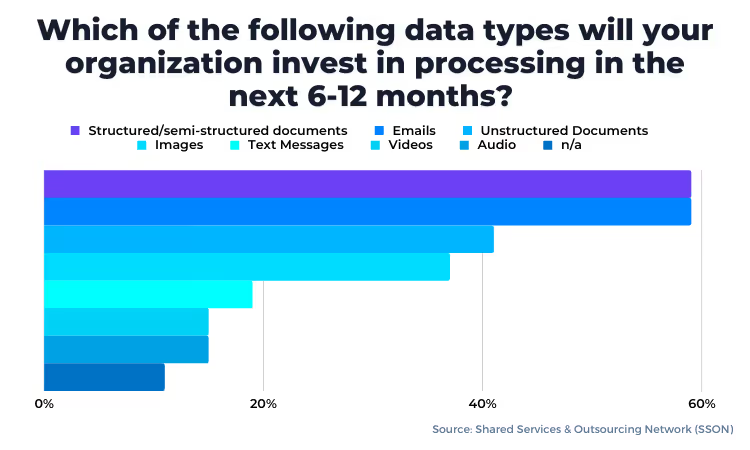

Data digitization remains a top priority for Shared Services and Outsourcing (SSO) and Global Business Services (GBS) leaders according to a recent report from the Shared Services and Outsourcing Network (SSON). However, most have a long way to go before becoming truly digital enterprises. The same study found that less than a third of SSO and GBS organizations are capturing and processing 50% or more of their unstructured data, which according to leading industry analysts represent 90% of all enterprise data.

Many enterprises want to move beyond processing invoices and purchase orders to emails and unstructured documents such as contracts and handwritten notes. More mature enterprises are moving to other data types such as images, video, and audio. However, most are still in the process of automating document-centric processes. This has led to rapid growth in the Intelligent Document Processing (IDP) market, which has ballooned from $1.2 billion in 2020 to an estimated $4.8 billion in 2022.

Despite corporate ambitions to increase the automated digitization and processing of complex documents, most IDP solutions still struggle to process 60-80% of invoices—and fail miserably with more complex documents that contain handwritten notes, tables, stamps, and other nonuniform elements. As a result, SSO organizations have continued to invest heavily in data entry workers. With the global economy decelerating, there is rising pressure on SSO & GBS leaders to drive costs down.
Many IDP solutions struggle to accurately process varied documents of the same type (e.g., invoices with different structures) and complex documents due to a closed design. Some solutions rely on proprietary AI models that can quickly become outdated compared to the fast and continuous advancement of cloud-based AI models developed by industry heavyweights like Google, Microsoft, and Amazon. Others rely heavily on a one or two popular optical character recognition (OCR) tools and/or document AI solutions. Although these products perform well for some use cases, they struggle with more complex ones and ultimately leave sizable processing gaps.
Super.AI’s novel approach to solving Unstructured Data Processing (UDP) challenges makes our technology a good fit for SSO and GBS organizations that want to move their digitization and automation journeys forward. Go beyond purchase orders and invoices to accurately process any document, regardless of complexity, as well as additional unstructured data types (e.g., images and video) using a single platform. There are four key reasons our technology makes this possible:
The Super.AI platform breaks down processing of a complex documents into smaller tasks, then uses the best available AI for each one. Three levels of artificial intelligence are leveraged to achieve the best results. To better illustrate this, let’s consider a bill of lading (BoL), a common logistics document:
This workflow can be easily customized to leverage multiple OCRs for a given task and the best available AI models for handwriting, stamps, signature detection, etc.
Accurately processing complex documents simply can’t be done without leveraging human ingenuity to train models and monitor quality as new and variable document types are submitted for processing. Super.AI is the only IDP vendor with ready-to-deploy, crowd-sourced data processing workers. Our crowd is carefully curated using thorough skills assessments, continuously measured using 150+ quality assurance mechanisms, and kept engaged and performing optimally using in-app gamification.
The super.AI Data Processing Crowd can be deployed in any region, ensuring cost effective Unstructured Data Processing at scale. This gives GBS organizations the option to use crowd-sourced workers instead of hiring and managing a high turnover workforce or having to rely on a BPO organization. The crowd can also be used to temporarily increase capacity amid workload surges.
As enterprise perceptions of artificial intelligence projects move away from the experimental phase and toward generating tangible ROI, companies must be able to rely on outputs from their AI investments. Super.AI allows enterprises to make trade-offs between quality, cost, and speed to deliver AI apps with outputs guaranteed to meet or exceed user-defined thresholds (e.g., 99.9% accuracy). Our platform intelligently combines results from AI, humans, and software, eliminating the need to tinker with field-level confidence levels to ensure compliance with Service Level Agreements (SLAs).
Super.AI was built from the ground up to process any data type—including documents, emails, images, videos, and audio—allowing GBS organizations to move up the value chain by automating increasingly complex use cases involving a variety of data types. SSO and GBS operators are moving beyond driving cost-saving through labor arbitrage to become business data service providers and trusted partners for their customers. Next-generation IDP vendors like super.AI can help accelerate this transition while alleviating a significant portion of the cost, time, and complexity associated with building, deploying, and maintaining AI solutions for unstructured data.


.svg)